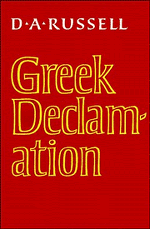1 - Evidence, definitions, origins
Published online by Cambridge University Press: 07 October 2011
Summary
Graecus rhetor, quod genus stultorum amabilissimum est. ‘A Greek rhetor, the nicest kind of fool.’
SenecaPretending to be someone else, and composing imaginary speeches in character, is an essential part of most literary activity. It is important not only in drama, epic and fiction, but also, at least in ancient times, in lyric poetry, history and philosophy. But it also has an educational function. Where public speech is important (as in the Greco-Roman world), it is important to train people in its skills. What better way than by inventing situations and giving one's pupils parts to play? And, since what is taught in school has at least some impact on what people do elsewhere, the practice, like other rhetorical practices, may be expected to have an influence on literature; and it is for this reason that scholars other than specialist students of rhetoric have found it of interest.
In Latin literature, therefore, this sort of exercise, under the name of declamatio, has been much studied; indeed, it has a recognized place in the histories of literature. It is received wisdom that, somewhere in the second half of the first century b.c., it suddenly became very popular and influential. The main evidence for this is the work of the elder Seneca, a collection of excerpts from the Controversiae (imaginary court cases) and Suasoriae (imaginary deliberative speeches) which he had heard from the famous declaimers of his youth and finally wrote down for his sons in his old age. Seneca is a beguiling author.
- Type
- Chapter
- Information
- Greek Declamation , pp. 1 - 20Publisher: Cambridge University PressPrint publication year: 1983



